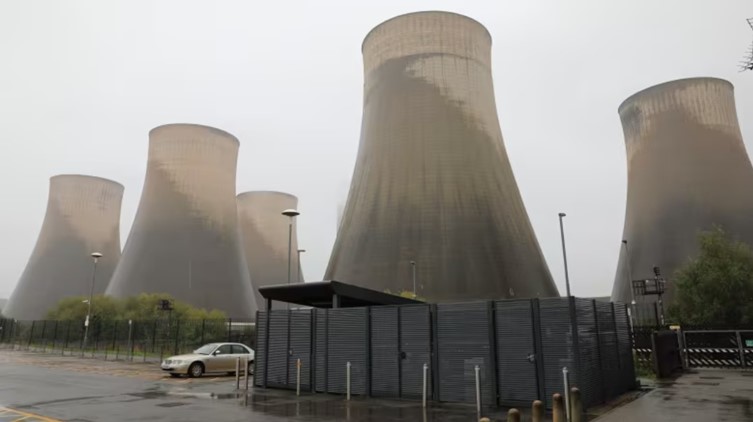
Britain was the first country to build a coal-fired power station in 1882, and this week became the first member of the G7 to phase out the facilities altogether.
"I think it is a good thing that it is going and it is a good thing the U.K. is leading the way," said Brian Hill, the chairman of the parish of Ratcliffe-on-Soar, near Nottingham in central England.
The 87-year-old watched the construction of the facility's eight 114-metre-high cooling towers in the 1960s, and now he is glad to see the sprawling site, which at one time employed several hundred workers, be decommissioned.
"It's a dirty fuel," he told CBC. "I prefer cleaner air."
The country's relatively rapid transition away from thermal coal, which was a key driver of the economy and still generated 80 per cent of Britain's electricity in 1990, is seen by many as a power symbol and proof that even the most coal-reliant countries can make that switch.
"It's a real proof point that transition and change can come very fast," said Matthew Webb, associate director of the Coal to Clean program with E3G, a U.K.-based independent climate think-tank. "We really got to get into the next gear and move up a level in terms of retiring the coal."
While many advanced economies, including Canada, have committed to phasing out thermal coal by 2030 and some European countries like Sweden and Austria have already accomplished that goal, there are still thousands of coal-fired power plants operating around the world.
In 2023, a new record for global coal consumption was set. It was primarily driven by new plants coming online in China.
Scientists say that in order to limit global warming to 1.5 C, the target established in the Paris Agreement in 2015, coal-fired power plants need to be phased out everywhere by 2040.
'A massive challenge'
In order to meet climate goals, Global Energy Monitor, a non-governmental organization based in the United States, estimates that coal-fired power plants, which account for about one-third of global emissions, need to be retired at a rate more than four times faster than is currently occurring.
"Globally, we still face a massive challenge. We have some [2,000 gigawatts] of coal power running today. That's nearly 9,000 coal plants," Webb said in an interview.
But he said the U.K.'s ability to fast-track its phaseout of coal will hopefully set an example to other countries.
More than half of Britain's electricity now comes from renewable sources such as wind and solar power. The rest from natural gas and nuclear energy.
But at one time coal was the leader. It helped drive the U.K's industrialization and grow the country's economy. It generated the steam to run railways and power factories and communities.
But the country's coal industry went through a dramatic transition long before global climate goals.
Political flashpoint
When Margaret Thatcher became prime minister in 1979, there were nearly 200,000 coal miners working at sites that were state-owned and losing money. In response to plans to close 20 mining pits, workers walked out and went on strike in 1984.
The Thatcher government's decision to denounce striking coal miners and quash pickets became a political flashpoint.
When Thatcher resigned as prime minister in 1990, there were about 50,000 coal miners left.
At one time, the Ratcliffe-on-Soar plant powered two million homes. It was slated to be closed in 2022, but under an agreement with the government, it stayed open for an additional two years because of a European-wide gas crisis triggered by Russia's invasion of Ukraine.
The plant, which is owned by Uniper, a German-based company, employed about 350 people before work wound down.
About half the workers will be involved in decommissioning the plant, which is expected to take two years.
'Optimistic' for a downward trend
"The U.K.'s coal plants were relatively old compared to other countries that have younger coal plants, but analysis does show … that it is possible by 2040 for even these young coal plants to be retired in an economically efficient way," said Lucy Hummer, a researcher in the coal tracker program with Global Energy Monitor in Washington, D.C.
Hummer said while coal-powered capacity increased last year, Hummer is "optimistic" that it could trend downwards soon.
China's thermal coal plants are not operating at their maximum capacity and are expected to operate at an even lower capacity in the future.
"The significant permitting of new coal plants in China is actually coming to an end. And there's hundreds of gigawatts of new renewables that are being installed," Hummer said.
Source: CBC – URL: https://www.cbc.ca/news/world/united-kingdom-coal-power-shutdown-1.7338597